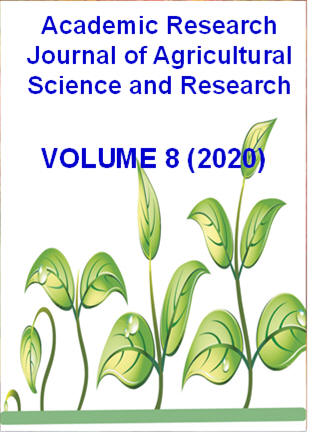|
ISSN: 2360-7874 |
Academic Research Journal of
Agricultural Science and Research |
|||||||||||||||||||
|
Vol. 8(4), pp. 423-431, May 2020 Research Impacts of Soil Acidity on Growth Performance of Faba bean (Vicia faba L.) and Management Options Mesfin Tadele
Holetta Agricultural Research Center, Ethiopian Institute of Agricultural Research, P. O. Box 2003, Addis Ababa, Ethiopia. Corresponding Author E-mail: mesfintadele64@gmail.com
Accepted 29 May 2020
Soil acidity is a major production constraint of crops in general and faba bean in particular in the highlands of Ethiopia. It has a proven impact on the growth performance of leguminous crops. It aggravates disease susceptibility and reduces plant vigour which leads to yield reduction in faba bean. Thus, this paper is reviewed with the objective to assess the impacts of soil acidity on growth and performance of faba bean and its management options. As crop production is decreasing improving the productivity of marginal areas like soil acidity is a major priority as a demand of food and raw materials are increasing rapidly. This can be achieved by using different soil acidity management options: lime application, use of soil acidity tolerant crops and breeding for soil acidity stress tolerance. Liming is a potential option for sustainable soil managements than other options for restoring soil health and fertility despite the amount required and unaffordable cost for low income farmers. Since, cultivated crops vary in their tolerance to soil acidity, choice of crops with better yield potential under stress environments is very important for economic reasons because use of tolerant varieties remains the first option and low cost. As wide diversity exists among faba bean landraces for different stresses like, chocolate spot, orobanche and water logging tolerant/resistance, the chance of getting soil acidity stress tolerance genotypes through breeding is not scanty. Therefore, selecting and developing acid-tolerant cultivars might be a sustainable approach for better growth and productivity of faba bean on acid soils which is eco-friendly and economically feasible alternative as a management option.
Keywords: Acid-tolerant, Faba bean, Lime and Soil acidity
How to cite this article (APA Style): Mesfin T (2020). Impacts of Soil Acidity on Growth Performance of Faba bean (Vicia faba L.) and Management Options. Acad. Res. J. Agri. Sci. Res. 8(4): 423-431
|
|||||||||||||||||||
